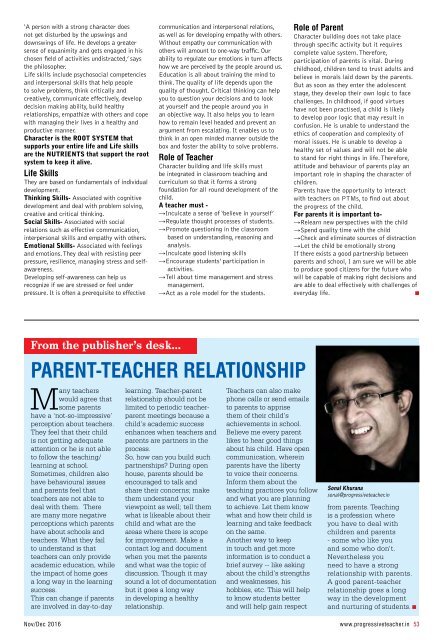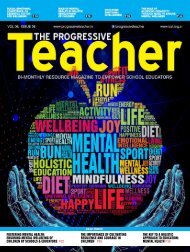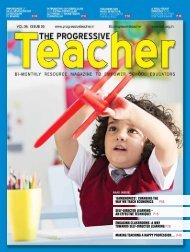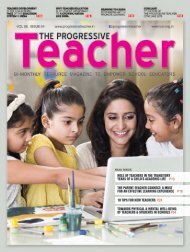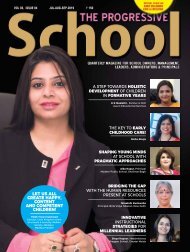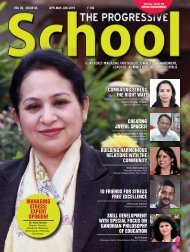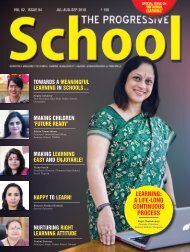The Progressive Teacher Vol 03 Issue 05
This issue of The Progressive Teacher focuses on "Teaching of Social Studies". The magazine provides guidance to the teachers by their peers and school leaders for tackling challenges with innovative ideas.
This issue of The Progressive Teacher focuses on "Teaching of Social Studies". The magazine provides guidance to the teachers by their peers and school leaders for tackling challenges with innovative ideas.
Create successful ePaper yourself
Turn your PDF publications into a flip-book with our unique Google optimized e-Paper software.
‘A person with a strong character does<br />
not get disturbed by the upswings and<br />
downswings of life. He develops a greater<br />
sense of equanimity and gets engaged in his<br />
chosen field of activities undistracted,’ says<br />
the philosopher.<br />
Life skills include psychosocial competencies<br />
and interpersonal skills that help people<br />
to solve problems, think critically and<br />
creatively, communicate effectively, develop<br />
decision making ability, build healthy<br />
relationships, empathize with others and cope<br />
with managing their lives in a healthy and<br />
productive manner.<br />
Character is the ROOT SYSTEM that<br />
supports your entire life and Life skills<br />
are the NUTRIENTS that support the root<br />
system to keep it alive.<br />
Life Skills<br />
<strong>The</strong>y are based on fundamentals of individual<br />
development.<br />
Thinking Skills- Associated with cognitive<br />
development and deal with problem solving,<br />
creative and critical thinking.<br />
Social Skills- Associated with social<br />
relations such as effective communication,<br />
interpersonal skills and empathy with others.<br />
Emotional Skills- Associated with feelings<br />
and emotions. <strong>The</strong>y deal with resisting peer<br />
pressure, resilience, managing stress and selfawareness.<br />
Developing self-awareness can help us<br />
recognize if we are stressed or feel under<br />
pressure. It is often a prerequisite to effective<br />
communication and interpersonal relations,<br />
as well as for developing empathy with others.<br />
Without empathy our communication with<br />
others will amount to one-way traffic. Our<br />
ability to regulate our emotions in turn affects<br />
how we are perceived by the people around us.<br />
Education is all about training the mind to<br />
think. <strong>The</strong> quality of life depends upon the<br />
quality of thought. Critical thinking can help<br />
you to question your decisions and to look<br />
at yourself and the people around you in<br />
an objective way. It also helps you to learn<br />
how to remain level headed and prevent an<br />
argument from escalating. It enables us to<br />
think in an open minded manner outside the<br />
box and foster the ability to solve problems.<br />
Role of <strong>Teacher</strong><br />
Character building and life skills must<br />
be integrated in classroom teaching and<br />
curriculum so that it forms a strong<br />
foundation for all round development of the<br />
child.<br />
A teacher must -<br />
→Inculcate a sense of ‘believe in yourself’<br />
→Regulate thought processes of students.<br />
→Promote questioning in the classroom<br />
based on understanding, reasoning and<br />
analysis.<br />
→Inculcate good listening skills<br />
→Encourage students’ participation in<br />
activities.<br />
→Tell about time management and stress<br />
management.<br />
→Act as a role model for the students.<br />
Role of Parent<br />
Character building does not take place<br />
through specific activity but it requires<br />
complete value system. <strong>The</strong>refore,<br />
participation of parents is vital. During<br />
childhood, children tend to trust adults and<br />
believe in morals laid down by the parents.<br />
But as soon as they enter the adolescent<br />
stage, they develop their own logic to face<br />
challenges. In childhood, if good virtues<br />
have not been practised, a child is likely<br />
to develop poor logic that may result in<br />
confusion. He is unable to understand the<br />
ethics of cooperation and complexity of<br />
moral issues. He is unable to develop a<br />
healthy set of values and will not be able<br />
to stand for right things in life. <strong>The</strong>refore,<br />
attitude and behaviour of parents play an<br />
important role in shaping the character of<br />
children.<br />
Parents have the opportunity to interact<br />
with teachers on PTMs, to find out about<br />
the progress of the child.<br />
For parents it is important to-<br />
→Relearn new perspectives with the child<br />
→Spend quality time with the child<br />
→Check and eliminate sources of distraction<br />
→Let the child be emotionally strong<br />
If there exists a good partnership between<br />
parents and school, I am sure we will be able<br />
to produce good citizens for the future who<br />
will be capable of making right decisions and<br />
are able to deal effectively with challenges of<br />
everyday life.<br />
From the publisher’s desk...<br />
Parent-<strong>Teacher</strong> Relationship<br />
Many teachers<br />
would agree that<br />
some parents<br />
have a ‘not-so-impressive’<br />
perception about teachers.<br />
<strong>The</strong>y feel that their child<br />
is not getting adequate<br />
attention or he is not able<br />
to follow the teaching/<br />
learning at school.<br />
Sometimes, children also<br />
have behavioural issues<br />
and parents feel that<br />
teachers are not able to<br />
deal with them. <strong>The</strong>re<br />
are many more negative<br />
perceptions which parents<br />
have about schools and<br />
teachers. What they fail<br />
to understand is that<br />
teachers can only provide<br />
academic education, while<br />
the impact of home goes<br />
a long way in the learning<br />
success.<br />
This can change if parents<br />
are involved in day-to-day<br />
Nov/Dec 2016<br />
learning. <strong>Teacher</strong>-parent<br />
relationship should not be<br />
limited to periodic teacherparent<br />
meetings because a<br />
child’s academic success<br />
enhances when teachers and<br />
parents are partners in the<br />
process.<br />
So, how can you build such<br />
partnerships? During open<br />
house, parents should be<br />
encouraged to talk and<br />
share their concerns; make<br />
them understand your<br />
viewpoint as well; tell them<br />
what is likeable about their<br />
child and what are the<br />
areas where there is scope<br />
for improvement. Make a<br />
contact log and document<br />
when you met the parents<br />
and what was the topic of<br />
discussion. Though it may<br />
sound a lot of documentation<br />
but it goes a long way<br />
in developing a healthy<br />
relationship.<br />
<strong>Teacher</strong>s can also make<br />
phone calls or send emails<br />
to parents to apprise<br />
them of their child’s<br />
achievements in school.<br />
Believe me every parent<br />
likes to hear good things<br />
about his child. Have open<br />
communication, wherein<br />
parents have the liberty<br />
to voice their concerns.<br />
Inform them about the<br />
teaching practices you follow<br />
and what you are planning<br />
to achieve. Let them know<br />
what and how their child is<br />
learning and take feedback<br />
on the same.<br />
Another way to keep<br />
in touch and get more<br />
information is to conduct a<br />
brief survey -- like asking<br />
about the child’s strengths<br />
and weaknesses, his<br />
hobbies, etc. This will help<br />
to know students better<br />
and will help gain respect<br />
Sonal Khurana<br />
sonal@progressiveteacher.in<br />
from parents. Teaching<br />
is a profession where<br />
you have to deal with<br />
children and parents<br />
- some who like you<br />
and some who don’t.<br />
Nevertheless you<br />
need to have a strong<br />
relationship with parents.<br />
A good parent-teacher<br />
relationship goes a long<br />
way in the development<br />
and nurturing of students.<br />
www.progressiveteacher.in 53


